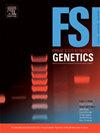基于独特分子标识的微单倍型MPS面板在复杂DNA混合物中的基因分型性能研究
IF 3.1
2区 医学
Q2 GENETICS & HEREDITY
引用次数: 0
摘要
在法医学中,混合DNA基因分型是一项关键而复杂的任务。测序错误和等位基因共享使分析复杂化,特别是在涉及不平衡混合物、多个贡献者和亲属关系的情况下。高多态性微单倍型(MHs)组成的大规模平行测序(MPS)为检测混合比大于10:1、涉及两个以上供体或有亲缘关系的供体的混合物中的独特等位基因提供了一种有前途的方法。然而,MPS平台上的碱基置换和InDels等测序错误仍然是复杂混合DNA基因分型的重大挑战。条形码方法已被引入MPS来区分真等位基因和测序错误。该方法采用独特的分子标识符(UMIs)来标记单个DNA分子,允许识别和纠正随机测序错误。通过从与同一UMI相关的读取重复中生成一致序列,该方法提高了等位基因检测的准确性。在本研究中,umi被纳入到一个由105个mh组成的高多态性群体中,平均有效等位基因数(Ae)为6.9。制备了各种类型的混合DNA样品,包括比例为1:1-160:1的不平衡混合物,2-6贡献者的多贡献者混合物,亲缘关系涉及父母-后代到四度亲属贡献者的混合物。对独特等位基因进行量化,并利用测序读数和超过10个成员的UMI家族数分别计算混合比例(Mx)。结果表明,UMI在不平衡混合物中识别测序错误和提高等位基因分型准确性方面发挥了关键作用。UMI计数与DNA模板数量之间有很强的相关性(R²= 0.96),表明DNA模板数量可以从UMI计数推断出来。由umi数量得出的Mx值在各个基因座之间是一致的,并且与混合比例高度相关(R2 = 0.85)。此外,该小组有效地检测了所有三种类型复杂DNA混合物中的独特等位基因。总的来说,这项研究强调了UMIs在减轻PCR和测序偏差方面的重要性,从而提高了MH-MPS面板对复杂DNA混合物基因分型的性能。UMIs是一种有价值的混合DNA基因分型工具,在概率基因分型方面具有更广泛的应用潜力。本文章由计算机程序翻译,如有差异,请以英文原文为准。
Investigation into the genotyping performance of a unique molecular identifier based microhaplotypes MPS panel in complex DNA mixture
In forensic science, genotyping mixed DNA is a critical and complex task. Sequencing errors and allele sharing complicate the analysis, particularly in cases involving unbalanced mixtures, multiple contributors, and kinship relationships. Massively parallel sequencing (MPS) panels comprising highly polymorphic microhaplotypes (MHs) offer a promising approach for detecting unique alleles in mixtures with a mixture ratio greater than 10:1, involving more than two contributors or contributors with kinship. However, sequencing errors such as base substitution and InDels on the MPS platform remain a significant challenge in genotyping complex mixed DNA. The barcoding approach has been introduced to MPS to distinguish true alleles from sequencing errors. This method employs unique molecular identifiers (UMIs) to tag individual DNA molecules, allowing for the identification and correction of random sequencing errors. By generating consensus sequences from read replicates associated with the same UMI, this approach enhances the accuracy of allele detection. In this study, UMIs were incorporated into developing a highly polymorphic panel consisting of 105 MHs, with an average effective number of alleles (Ae) of 6.9. Various types of mixed DNA samples were prepared, including unbalanced mixtures with ratios ranging from 1:1–160:1, multi-contributor mixtures with 2–6 contributors, and kinship-involved mixtures with parent-offspring to fourth-degree relatives contributors. Unique alleles were quantified, and mixture proportions (Mx) were calculated separately using sequencing reads and the number of UMI families with more than 10 members. The results demonstrated that UMI played a critical role in identifying sequencing errors and enhancing the accuracy of allele genotyping in unbalanced mixtures. A strong correlation (R² = 0.96) between UMI count and DNA template amount demonstrated that DNA template amount could be inferred from UMI count. Mx values derived from the number of UMIs were consistent across loci and showed a high correlation with mixture ratios (R2 = 0.85). Additionally, the panel efficiently detected unique alleles across all three types of complex DNA mixtures. Overall, this study underscores the importance of UMIs in mitigating PCR and sequencing biases, thereby improving the performance of the MH-MPS panel for genotyping complex DNA mixtures. UMIs represent a valuable tool for mixed DNA genotyping and hold potential for boarder applications in probabilistic genotyping.
求助全文
通过发布文献求助,成功后即可免费获取论文全文。
去求助
来源期刊
CiteScore
7.50
自引率
32.30%
发文量
132
审稿时长
11.3 weeks
期刊介绍:
Forensic Science International: Genetics is the premier journal in the field of Forensic Genetics. This branch of Forensic Science can be defined as the application of genetics to human and non-human material (in the sense of a science with the purpose of studying inherited characteristics for the analysis of inter- and intra-specific variations in populations) for the resolution of legal conflicts.
The scope of the journal includes:
Forensic applications of human polymorphism.
Testing of paternity and other family relationships, immigration cases, typing of biological stains and tissues from criminal casework, identification of human remains by DNA testing methodologies.
Description of human polymorphisms of forensic interest, with special interest in DNA polymorphisms.
Autosomal DNA polymorphisms, mini- and microsatellites (or short tandem repeats, STRs), single nucleotide polymorphisms (SNPs), X and Y chromosome polymorphisms, mtDNA polymorphisms, and any other type of DNA variation with potential forensic applications.
Non-human DNA polymorphisms for crime scene investigation.
Population genetics of human polymorphisms of forensic interest.
Population data, especially from DNA polymorphisms of interest for the solution of forensic problems.
DNA typing methodologies and strategies.
Biostatistical methods in forensic genetics.
Evaluation of DNA evidence in forensic problems (such as paternity or immigration cases, criminal casework, identification), classical and new statistical approaches.
Standards in forensic genetics.
Recommendations of regulatory bodies concerning methods, markers, interpretation or strategies or proposals for procedural or technical standards.
Quality control.
Quality control and quality assurance strategies, proficiency testing for DNA typing methodologies.
Criminal DNA databases.
Technical, legal and statistical issues.
General ethical and legal issues related to forensic genetics.

 求助内容:
求助内容: 应助结果提醒方式:
应助结果提醒方式:


